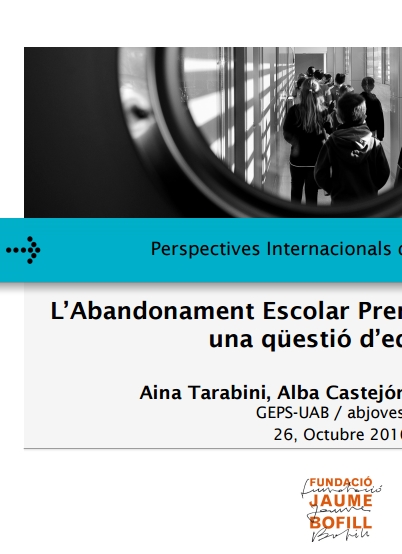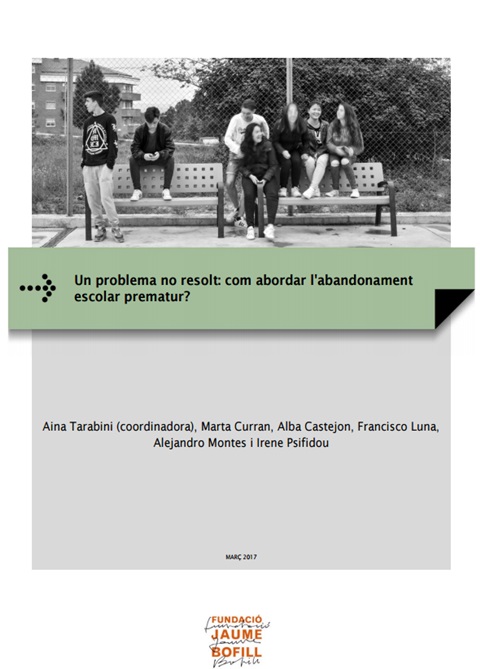PERSPECTIVES INTERNACIONALS D'EDUCACIÓ: Presentació a Barcelona de la darrera recerca del CEDEFOP sobre la situació de l'abandonament escolar prematur a Europa. #abandonament #perspectivesbofill
Intervenen: Irene Psifidou, analista de polítiques educatives, European Centre for the Development of Vocational Training (CEDEFOP); Aina Tarabini, professora de sociologia a la Universitat Autònoma de Barcelona i investigadora dels grups de recerca GEPS (Globalització, Educació i Política Social) i GIPE (Grup Interdisciplinar de Polítiques Educatives); i Francisco Luna, coordinador de l’Equip de Didàctica de l’Institut basc d’avaluació i investigació educativa no universitària (ISEI-IVEI). És expert en avaluació i coordinador de diversos estudis sobre l’efecte de la repetició de curs i l’abandonament escolar.
Quina és la situació de l’Abandonament Escolar Prematur (AEP) a Europa? Per què al País Basc tenen una taxa d'abandonament prematur tant baixa? Quines polítiques s’estan aplicant per a fer-hi front? Quines són les condicions per a garantir l’èxit d’aquestes polítiques? Quin rol juguen les característiques dels sistemes educatius europeus en l’explicació de l’AEP?
Tal com es desprèn de l’informe, l’Abandonament Escolar Prematur és una realitat que afecta, tot i que amb intensitat i forma diferent, a tots els països de la Unió i que tot i els efectes de la crisi, segueix persistint amb força. L’informe identifica els factors de l’AEP, n’analitza les seves conseqüències personals i socials i estableix un marc comprensiu de polítiques per a fer-hi front que inclou la prevenció, la intervenció i la compensació.
Així mateix, aquest informe, junt amb altres informes internacionals que s’han publicat recentment sobre el tema, contribueixen a assenyalar que l’AEP no només posa en risc les possibilitats de desenvolupament socioeconòmic del país sinó que alhora qüestiona els propis ciments de la cohesió social. L’AEP està intrínsecament relacionat amb les característiques de l’alumnat en termes de gènere, estatus socioeconòmic i origen migratori o ètnic i, per tant, posa sobre la taula a qüestions cabdals d’equitat social i educativa.
Accediu als diferents materials generats aquí:
---------------------------------------------
International Perspectives on Education Conference
Presentation of the last research of the CEDEFOP held in Barcelona on October 26th and conducted by Jaume Bofill Foundation: "An unsolved problem: How to adress early school leaving?" /agenda/unresolved-issue-how-tackle-early-leaving-education #abandonament #perspectivesbofill
Speakers: Irene Psifidou, education policy analyst, European Centre for the Development of Vocational Training (CEDEFOP); Aina Tarabini, professor of Sociology at the Autonomous University of Barcelona and member of GEPS (Globalization, Education and Social Policy) and GIPE (Interdisciplinary Group for Educational Policy) research groups; andFrancisco Luna, coordinator of Teaching Team of Basque Institute for evaluation and non-university educational research (ISEI-IVEI). Expert assessor and coordinator of several studies on the effect of grade repetition and school leaving.
As is clear from the CEDEFOP report, early school leaving is a reality that affects, although in different intensity and forms, all EU countries and, despite the effects of the crisis, it is still persisting hard. The report identifies the ELET factors, analyses the personal and social consequences and establishes a comprehensive framework of policies to deal with them, including prevention, intervention and compensation.
Also, international reports have attributed a key importance to the role played by the post-compulsory education (its offer, structure, prestige, etc.) in the fight against ESL. In particular, in November 2016 CEDEFOP will publish a report on the specific role of vocational training in this process that we discussed in depth in this event.








